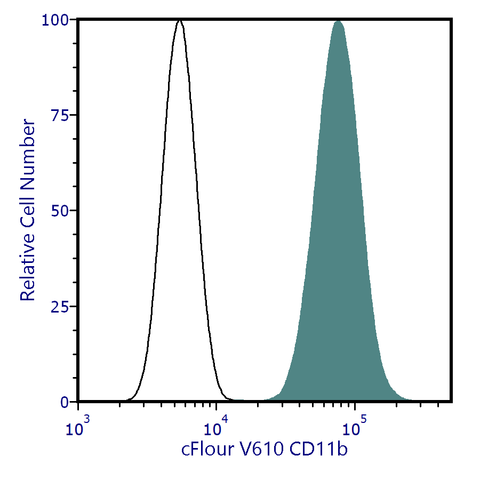
cFluor® V610 Anti-Human CD11b (ICRF44)
カートを見る または ショッピングを続ける
説明
The ICRF44 monoclonal antibody reacts with human CD11b, a 165-170 kD type I transmembrane glycoprotein also known as αM integrin, Mac-1, CR3, and C3biR. CD11b associated with integrin β2 (CD18) is expressed on the surface of monocytes, granulocytes, activated lymphocytes and a subset of NK cells. CD11b is a receptor for intercellular adhesion molecule family members CD54, CD102 and CD50 as well as for iC3b. These adhesions are crucial in cell-cell and cell-matrix interactions. The antibody was conjugated to a fluorophore and purified by chromatography.
PRODUCT DETAILS
Clone: ICRF44
Reactivity: Human, Baboon, Chimpanzee, Cynomolgus Monkey, Rhesus Monkey
Format: cFluor® V610
Isotype: Mouse IgG1, κ
Tested Dilution: 5 μL / test
Application: Flow Cytometry
Storage: 2-8°C and protected from Light. Do not freeze
Formulation: Phosphate-buffered solution, pH 7.2, containing 0.09% sodium azide and 0.2% BSA (Origin USA)
RECOMMENDED USAGE
Each lot of this antibody is quality control tested using flow cytometric analysis. For flow cytometric staining, the suggested use of this reagent is 5 µL per 1 million cells in a staining volume of 100 µL. If whole blood is analyzed, then use 5 µL per 100 µL. It is recommended that users titrate the antibody to obtain the optimal result for their specific application.
Please briefly centrifuge the reagent vial before use.
Use appropriate personal protective equipment per the product safety data sheet when using this product.
REFERENCES
- Knapp W. 1989. Leucocyte Typing IV. Oxford University Press New York.
- Barclay N, et al. 1997. The Leucocyte Antigen Facts Book. Academic Press Inc. San Diego.
- Marsik C, et al. 2003. Shock 20:493.
- Charles N, et al. 2010. Nat. Med. 16:701.
- Thurlow LR, et al. 2010. Infect. Immun. 128:1128.
- Sestak K, et al. 2007. Vet. Immunol. Immunopathol. 119:21.
- Wen T, et al. 2014. J Immunol. 192:5481.
These products are for research use only. Not intended for use in diagnostic procedures.
